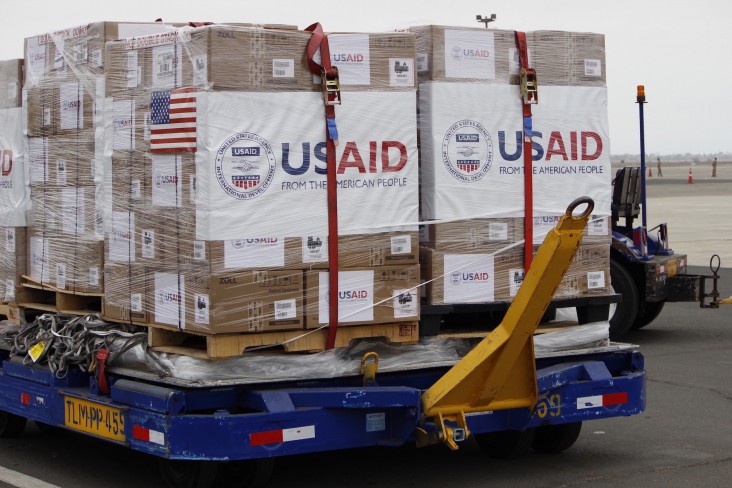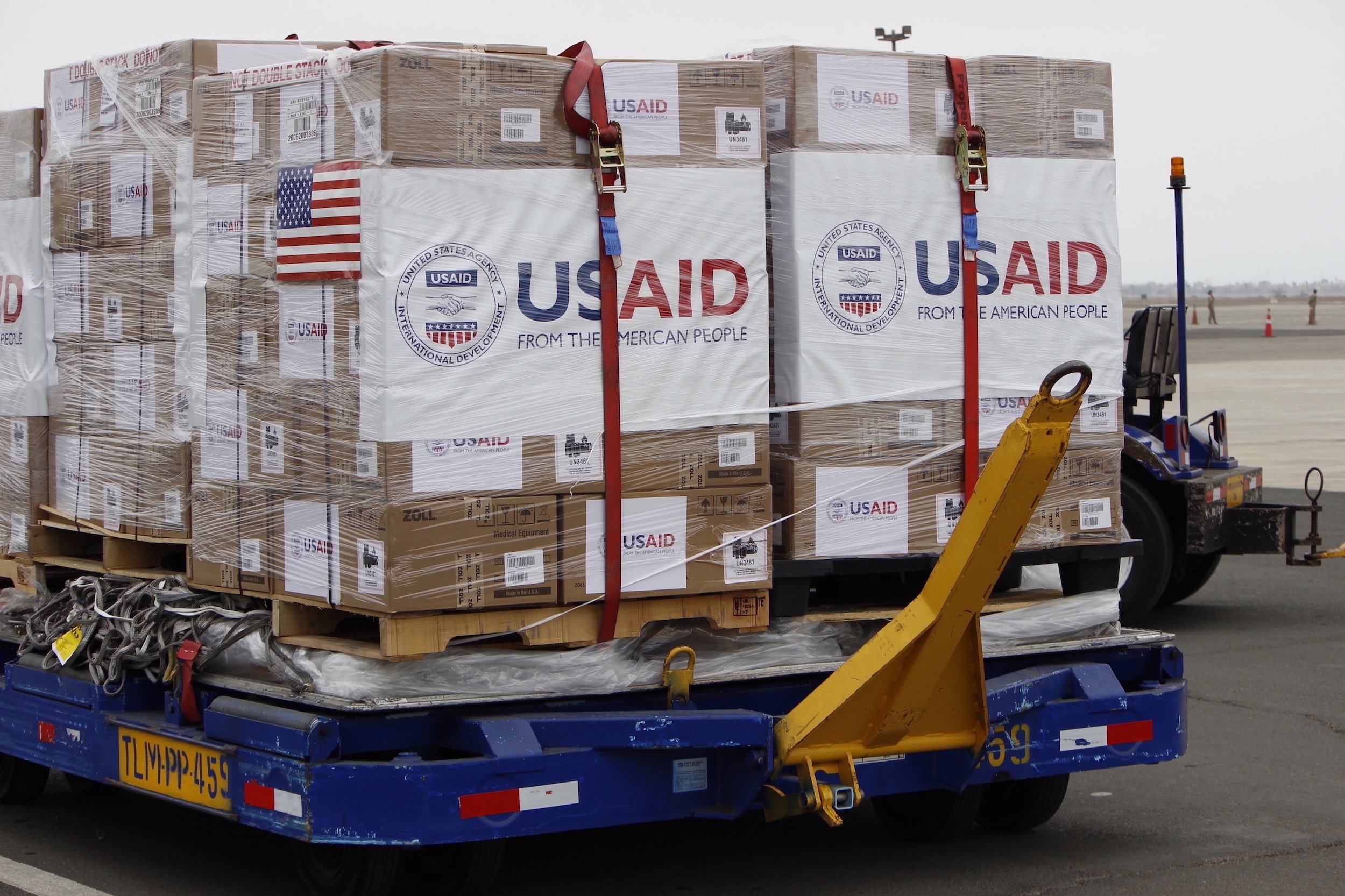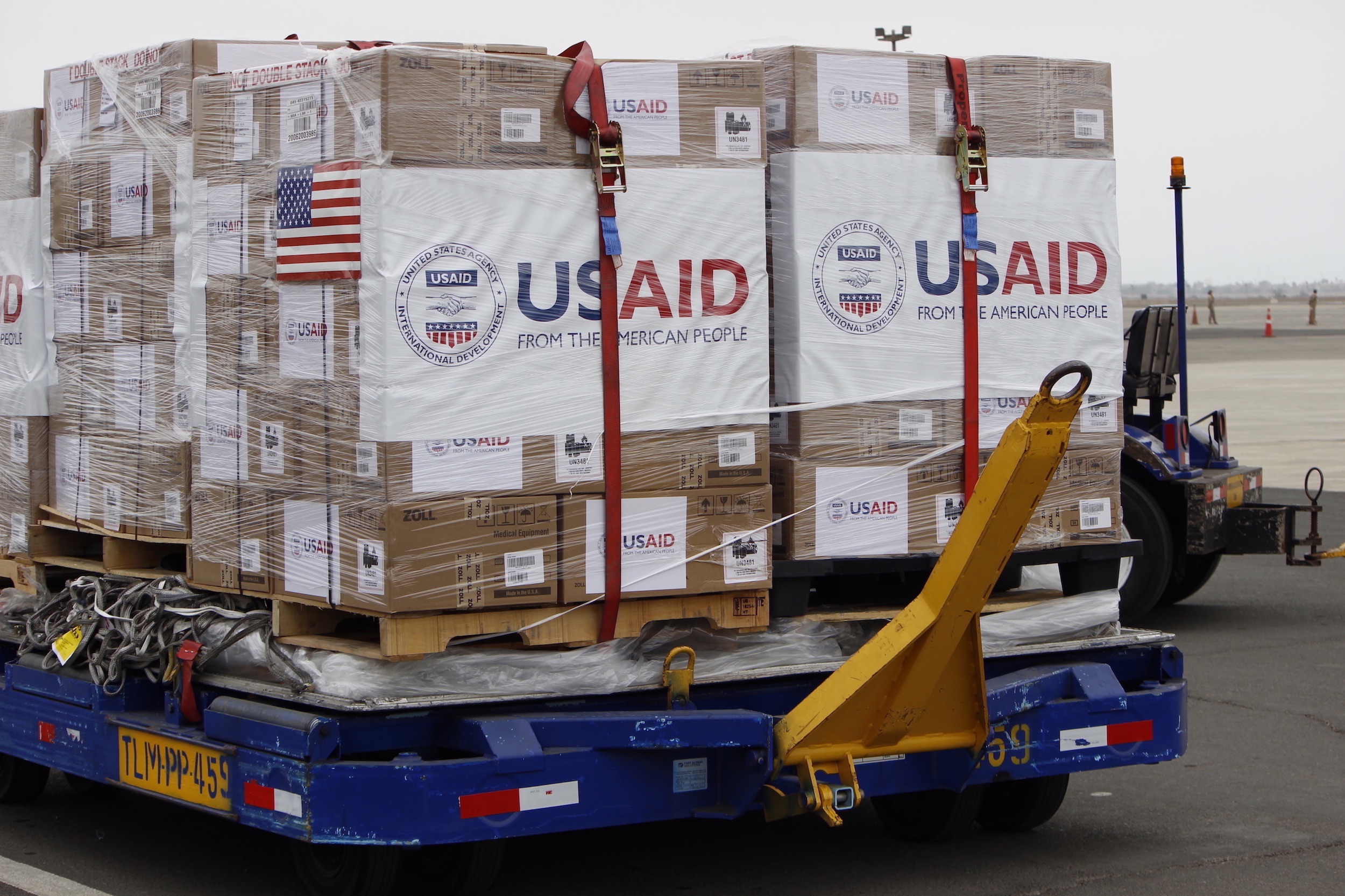Speeches Shim

As of November 2020, the U.S. Government has allocated more than $30.3 million in new resources to assist Peru in its emergency response to COVID-19. The aid continues a strong history of investing in Peru’s health care systems and long-term development, mainly through the U.S. Agency for International Development (USAID).
Ongoing U.S. Government-funded programs and partners are also adapting activities to respond to this unprecedented crisis. Over the last 20 years, U.S. assistance to Peru totals more than $3.5 billion, including $265 million in the health sector. Emergency assistance comes from USAID’s Bureau for Humanitarian Assistance, the Department of Defense Humanitarian Assistance Program, and the Department of State’s Emergency Refugee and Migration Assistance fund.
NEW ACTIVITIES - COVID-19 RESPONSE
INTERNATIONAL DISASTER ASSISTANCE - COVID 19 SUPPLEMENTAL SUPPORT
Partners: ADRA (Adventist Development and Relief Agency), Americares, RET International, Save the Children, Socios en Salud, and World Food Programme
Total USAID/Washington (BHA) Investment: $7 million - Duration: July 2020 – January 2021
Six new grants through the USAID’s Bureau for Humanitarian Assistance will provide humanitarian assistance aimed at alleviating the impacts of COVID-19 in those communities most affected by the pandemic. This assistance helps alleviate strain on Peru’s overburdened health system through disease surveillance and clinical case management, as well as access for primary care and mental health services for vulnerable populations through community based support, mobile medical clinics and medical teleconsultations. Activities afford protective services to children and victims of gender-based violence. Finally, interventions help reduce COVID-19 infection through the provision of basic hygiene supplies and clean water, and support for public health, hygiene and risk reduction communications campaigns. Target communities are those in regions where insecurity, limited health services and poverty combine to accelerate risk for COVID-19 transmission.
ALLIANCE WITH PARTNERS IN HEALTH
Partner: Socios En Salud, local affiliate of Partners In Health
Total USAID Investment: $3.9 million - Duration: April 2020 – April 2021
This Alliance supports aggressive contact tracing, community mobilization, and systematic screening and isolation to prevent community spread of COVID-19. The Alliance administers COVID-19 tests (with private funds) for the most vulnerable patients, provides medical teleconsultations, and activates a community health worker network to safely reach families in need of clinical and social support. The Alliance is also improving oxygen generation capabilities, severe case management capacity, and infection prevention and control in health facilities prioritized by Peru’s Ministry of Health. The investment mobilizes private contributions, including over $1 million from Boston-based Partners In Health.
ALLIANCE FOR SOCIAL AND ECONOMIC RECOVERY IN THE PERUVIAN AMAZON
Partners: CEDRO (Peruvian NGO) and Rainforest Foundation (U.S.-based NGO and sub-partner)
Total USAID Investment: $3 million - Duration: May 2020 – May 2022
This Alliance helps mitigate the adverse impacts of the COVID-19 pandemic on vulnerable populations, particularly in indigenous communities and other vulnerable areas in the Amazon. Leveraging local private partners, the activity mobilizes community health promoters, deploys a risk communication and community engagement strategy, and expands community-based psychosocial services. The Alliance also addresses economic recovery by providing business development assistance to micro-, small- and medium-sized entrepreneurs and expanding access to credit for business expansion.
COVID-19 RESPONSE FOR MIGRANTS AND REFUGEES
COVID-19 SUPPLEMENTAL EMERGENCY REFUGEE AND MIGRATION ASSISTANCE
Partners: International Organization for Migration (IOM), UN Fund for Children (UNICEF),
UN High Commission for Refugees (UNHCR)
Total State Department/Population, Refugees and Migration Bureau (PRM) Investment: $3.925 million
($3,3 million UNHCR / $415,000 IOM / $210,000 UNICEF) - Duration: Ongoing
These funds support COVID-19 related needs for refugees, migrant, and host communities in Peru, expanding the ongoing work of international organizations with a longtime partnership in the country.
CASH TRANSFER PROGRAM
Partner: World Food Programme
Total USAID Investment: $5 million - Duration: July - September 2020
This contribution provided two monthly cash transfer distributions of $37.20 per individual per month to Venezuelan migrants in Peru, affected by the COVID pandemic. This is roughly equivalent to the GOP's emergency transfer program for vulnerable Peruvians.
ECONOMIC SUPPORT FOR VULNERABLE VENEZUELANS
Partner: Acción Contra el Hambre
Total USAID Investment: $250,000 - Duration: May - June 2020
This short-term project helped mitigate the economic impacts of the COVID-19 quarantine on Venezuelan migrants and refugees in Lima. The grant boosted household budgets through access to basic household items, and provided health information. Through an extensive volunteer network, the project assisted 4,200 Venezuelan families and nearly 16,800 people in one month.
TECHNICAL ADVICE TO THE GOVERNMENT OF PERU
TRANSPARENT PUBLIC INVESTMENT ACTIVITY
Partner: Chemonics International - Duration: January 2020 – January 2024
This ongoing USAID project supports Peruvian partners to reduce corruption by strengthening internal controls and oversight in public procurement. Responding to a Ministry of Health request to facilitate urgent health procurements, the project embedded a short-term technical expert to accelerate procurements for urgently needed COVID-19 medications, oxygen systems, and protective supplies.
The expert facilitated $132 million in essential purchases for health care workers to respond to the COVID-19 crisis. The assistance also included technical recommendations to address procurement challenges, shore up staffing shortages, and streamline protocols for emergency public health purchasing.
SENIOR ADVISOR TO MINISTRY OF HEALTH
Peru’s Ministry of Health requested the support of USAID’s Senior Health Advisor to provide infectious disease expertise, technical advice and specialized analytical support to shape Peru’s national response to the COVID-19 pandemic. Dr. Jaime Chang, a physician and 22-year senior health specialist with USAID, assumed this role to support Peru’s formulation of public health guidelines during the current crisis.
SUPPORT TO MINISTRY OF EDUCATION - “APRENDO EN CASA”
Partners: Institute for Democracy and Electoral Assistance (IDEA) and U.S. Forest Service (USFS)
Through existing citizen engagement and forest conservation activities, USAID provided civics and environmental education content for Peru's national “Learn at Home” online education program, while schools remain closed during the pandemic. IDEA produced videos and teachers guides for secondary students on democratic values, political reforms, and the importance of civic engagement in a democracy. The USFS developed biodiversity-related material for fifth and sixth graders on the use and conservation of native medicinal plants, the importance of trees in the city, threatened Peruvian wildlife, and the relationship between forests and water. Videos reach students nationwide.
DIRECT ASSISTANCE
PORTABLE VENTILATORS
USAID investment: $6.4 million
On June 23, the U.S. Government delivered 17 pallets with 250 ventilators to the Government of Peru, for Ministry of Health distribution to 28 public hospitals in Lima and the regions of Áncash, Arequipa, Cusco, Ica, La Libertad, Lambayeque, Lima, Piura, and Tumbes. The donation aids patients requiring intensive oxygen support and increased Peru’s ventilator capacity by 19 percent. On October 3, the U.S. Government delivered another 250 ventilators to the Government of Peru that the Ministry of Health will distribute to public hospitals in the highest need regions. These portable “field ventilators” have proven versatile and well-suited for use in remote regions of Peru.
PERSONAL PROTECTIVE EQUIPMENT (PPE) and FIELD HOSPITALS
U.S. Southern Command Humanitarian Assistance Program (HAP) Investment: $890,000
Through the Department of Defense HAP, Peru will receive two field hospitals for use in areas hardest hit by COVID-19, as well as PPE donations for Cayetano Heredia and María Auxiliadora Hospitals in Lima and Regional Hospitals in Piura, Lambayeque and Loreto.
TRANSPORT SHUTTLES and PASSPORT SCANNERS
State Department/International Narcotics and Law Enforcement (INL) $350,000
INL programs with longtime Peruvian law enforcement partners facilitated delivery of two isolation and transport cabins (“epishuttles”) to the Peruvian National Police Aviation Bureau (DIRAVPOL) to improve safe transfer and infection control. INL also donated PPE and 40 passport readers to assist Peru to reopen borders and aid Peru’s migration agency to safely process international travelers by mitigating risks associated with COVID-19, while enhancing capabilities to detect fraudulent documents.
PERSONAL PROTECTIVE EQUIPMENT (PPE) and TEST KITS
U.S. Naval Medical Research Unit 6 (NAMRU-6) has assisted the Peruvian Naval Hospital in Callao to monitor healthcare workers on the front lines and performed COVID-19 testing for at-risk members of the Callao fire department after an outbreak among firefighters. NAMRU-6 donated rapid test kits to the military and health department in Iquitos and PPE and laboratory materials to the Peruvian National Institute of Health. NAMRU has also assisted the Peruvian Army and Ministry of Health in evaluating COVID-19 treatments and testing.
TEST KITS
The International Atomic Energy Agency (IAEA) made an international donation of test kits to countries worldwide, including two tranches of 2,000 test kits for Peru, valued at $200,000.
ONGOING USAID ACTIVITIES with COVID-19 INITIATIVES
CITIZEN ENGAGEMENT FOR TRANSPARENCY
Partner: Asociación Civil Transparencia - Duration: April 2018 - October 2021
With USAID technical and financial support, leading Peruvian civil organization Transparencia has helped Peru’s Office of the Prime Minister to develop a smartphone app and web platform for citizens to denounce public sector corruption. This platform quickly added a special module to report potential misuse of public funds distributed for the COVID emergency at national, regional and municipal level. With $70 million in cash transfers distributed to vulnerable populations from the pandemic, chances for graft have increased, making the app more important to avert misuse of public resources.
AMAZONIAN ENVIRONMENTAL RESEARCH AND SUSTAINABILITY
Partner: Center for Amazonian Scientific Innovation (CINCIA) - Duration: March 2016 - February 2021
This activity combats environmental degradation and improves human well-being in the Amazonian region of Madre de Dios, among the most biodiverse and environmentally threatened areas in Peru. With the advance of COVID-19, CINCIA with Peru’s Native Federation of the Madre de Dios River and Tributaries (FENAMAD) developed a local radio campaign in indigenous languages – Machiguenga, Yine and Harakmbut – to promote healthy practices in indigenous communities.
COMBATING HUMAN TRAFFICKING IN PERU
Partner: Capital Humano y Social Alternativo (CHS) - Duration: July 2014 - June 2020
During Peru’s COVID-19 state of emergency, leading anti-trafficking civil organization CHS implemented a short-term social media communication campaign to prevent human trafficking, sexual exploitation of children, and other forms of gender-based violence. The campaign reached more than 900,000 people in its first month. As cases of gender-based violence increased during Peru’s quarantine period, the campaign also provided telephone consultations and advice to potential victims of violence.
SECURING A SUSTAINABLE, PROFITABLE, AND INCLUSIVE FOREST SECTOR IN PERU - PRO-BOSQUES ACTIVITY
Partner: Tetra Tech ARD - Duration: September 2018 – September 2023
This activity strengthens capacity to sustainably manage Peru’s forest resources to conserve biodiversity, reduce carbon emissions, increase competitiveness, and combat illegal logging.
In response to the COVID-19 pandemic, Pro-Bosques provided technical assistance to national and subnational counterparts to prepare biosecurity guidelines for safe forest harvesting and provided guidance to beneficiaries on accessing public funding for forest sector activities, through Peru’s economic reactivation initiative. The activity also has helped indigenous organizations and regional and local authorities to utilize biosecurity measures during the implementation of indigenous community life plans, community control and oversight functions, and forest management activities.
INTEGRATED ALTERNATIVE DEVELOPMENT PROGRAM
Multiple Programs/Partners: DEVIDA Multiyear Plan; Alliance For Digital and Financial Services; Peru Cacao Alliance; Coffee Alliance for Excellence (CAFE) -- September 2017 - December 2022
The COVID-19 crisis affects remote farming communities uniquely. USAID partners with the Government of Peru to help farmers end coca cultivation and begin licit livelihoods. During the pandemic, USAID has adapted activities to increase farm families’ understanding of health safety measures and secure livelihoods during harvest seasons. Farmer alliances promote hygiene campaigns and health protocols to help improve biosecurity when transferring agricultural goods to market. Other activities provide farmers one-on-one technical advice by phone to maintain crops and incomes. Partners share information through mobile app-based groups, webinars, radio theater, and online advertising to reduce and avert cases of gender-based violence. Target regions include, but are not limited to, Huánuco, San Martín and Ucayali.



Comment
Make a general inquiry or suggest an improvement.